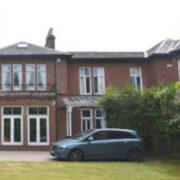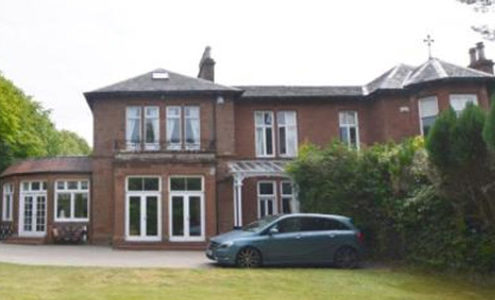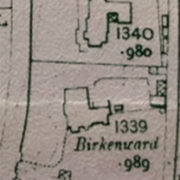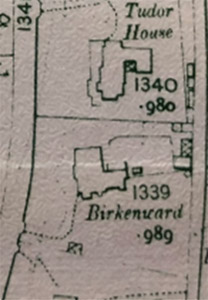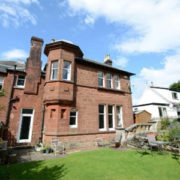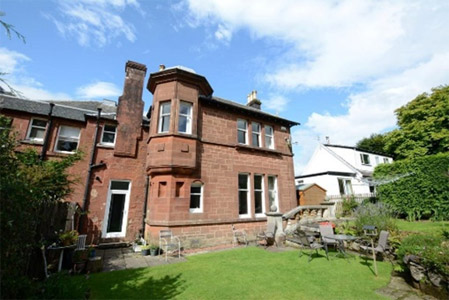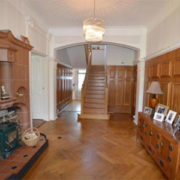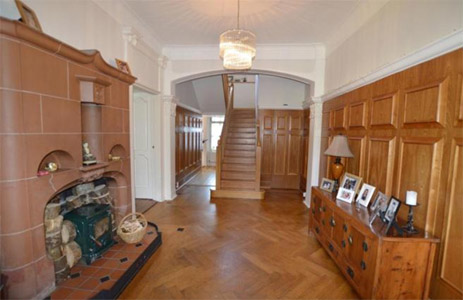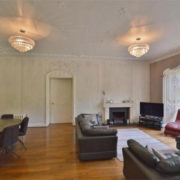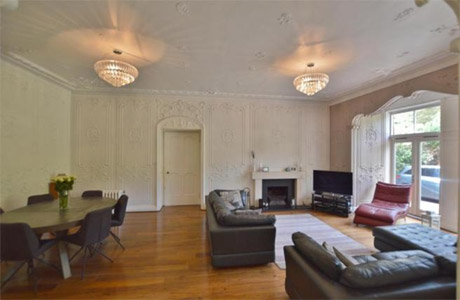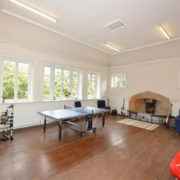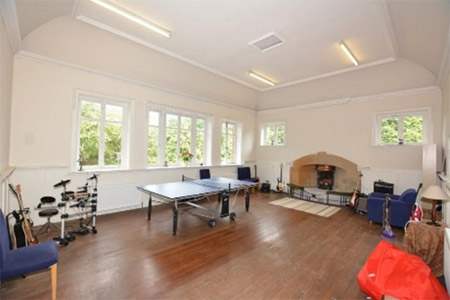11 The Crescent, Skelmorlie – B Listed
Source of Photos: 1., 4, & 5. – Rightmove.co.uk 2. 1910 Ordinance Survey Map. 3. & 6. Corum Sales Brochure
| Owners | Dates | Alterations |
|---|---|---|
| Circa 1880 | Build date & architect unknown | |
| Captain James McInroy | 1886 | |
| John E Wilson | 1903 | |
| 1904 | Re-modeled in Arts & Craft Style | |
| Post 1912 | Rear wing added | |
| Birkenward Hostel | 1940 – 1941 | Run as a hostel for evacuees |
| Mr & Mrs J Dunlop Bell | 1949 | |
| Nursing Home | 1950’s – mid 1970’s | |
| Late 1970’s | Converted into 3 dwellings; 11a , 11b & 11c. |
Owners/history not listed beyond this point.
Research:
- Probably late 19th century, with re-modelling 1904 in arts and crafts manner. Asymmetrical 2-storey villa, substantial earlier 20th century (plainer) rear wing. Original house has canted south gable, 4-bay south elevation, outer bays advanced, and linked by open wooden veranda with decorative shaped capitals, door and French windows behind.
Interior: some good art nouveau decoration; hall has square columns and pilasters with decorative capitals, some linked by segmental arches; timber panelling; chimneypieces – that in hall has semi-circular recesses flanking niche. Low, canted lounge to north; irregular rear wings, arcaded service area to north wall, corbelled angle turret to south west angle of later addition. Application to build rear wing not submitted to District Committee by 1912 (later minutes not examined). Source: Historic Scotland Listing - Captain James McInroy, Birkenward, Skelmorlie. Source: Slater’s Royal National Directory, 1886.
- John E Wilson, The Birkenward. Source: Slater’s Royal National Directory, Skelmorlie, 1903.
-
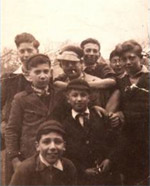
Jewish refugees evacuated to Skelmorlie, 1940s
With the accession to power of Hitler’s National Socialist Party in 1933, life became increasingly difficult for Jews living in Germany… Refugee children began arriving in Glasgow in 1934. By 1938, the first Kindertransport were organised to take children out of Germany. Some of whom found homes in Glasgow with families, in orphanages or in hostels organised by the local community. After the outbreak of the war, many Glaswegian children were evacuated to country areas because of the risk of German bombing raids on the city. Jewish children, including refugees, were evacuated to Skelmorlie or Castle Douglas”. Source: Newspaper clipping Facebook: Skelmorlie & Wemyss Bay in their heyday.
-
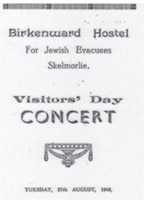
Concert
“Towards the early part of l940, more complicated arrangements were made for us. A large house in Skelmorlie, overlooking the Clyde, was used as an evacuation hostel for between 60 & 80 children. Initially there was school included in the house. We had about 7 or 8 teachers for the various subjects, in addition to domestic staff. In Birkenward, we were completely wild. When the teachers were there, we were given a qualifying examination, which at that time was the deciding factor for going from primary to secondary. We did extremely badly, because we had no idea how to sit examinations and particularly examinations where one had to answer questions yes or no. We knew we did badly, but we felt that the procedure was unfair. So, a crowd of us raided the cupboard in which the examination papers were kept and altered the answers to give us a better mark. ……… Teaching stopped in Birkenward and we went to school at Greenock High, daily by bus. We generally did fairly well and were there from about middle of l940 to l941. We participated in the life of the school…. We went swimming in the Clyde quite a bit…. We got sixpence pocket money every week & we often went to Wemyss Bay station to help passengers carry their baggage from the train to the boat and vice versa, for tips, to enable us to make up sufficient money to go to the pictures (6 & 1/2d) & maybe have a bag of chips. We appear to have been extremely well fed despite wartime restrictions. I don’t think there were any problems about our physical wellbeing but we had considerable problems with our carers. They had no training in looking after children & there was considerable physical punishment for minor transgressions. Once when we had done something trivial like speaking at meals, the meal was abandoned, which in effect created a revolt and we smashed the glasshouse in the grounds. This again resulted in the committee from Glasgow coming down to read the riot act. But we were not too worried about things like that. We were fairly good at surviving by this time. Eventually the hostel was closed after about a year & we were sent to another in Castle Douglas. Source: Sounds.bl.uk – Earnest Marchand interviewed by Louise Coutts.
- A marriage has been arranged between Archibald Angus Bell M.A., only son of Mr & Mrs J Dunlop Bell, The Birkenward, Skelmorlie, and Dorothy Goalen, daughter of Dr and Mrs Pollok Donald of Leith. Source: The Scotsman, 23rd April 1949 – Page 4- Forthcoming Marriages.
-
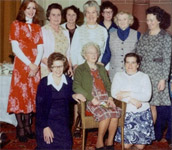
Mrs Aitken’s 100th Birthday Party, Birkenward, 1970s.
During the 1950s through to the 70s, Birkenward became a nursing home. During this time, a Mrs Aitken celebrated her 100th Source: Mr & Mrs MacKenzie, owners 11c Birkenward.
- In the late 70s, the nursing home closed and Birkenward was put on the market. Three local men purchased it and converted it into three substantial dwellings by splitting the original house vertically to create 11a and b and creating 11c in the rear of the house. Source: Mr & Mrs MacKenzie, owners 11c Birkenward.

